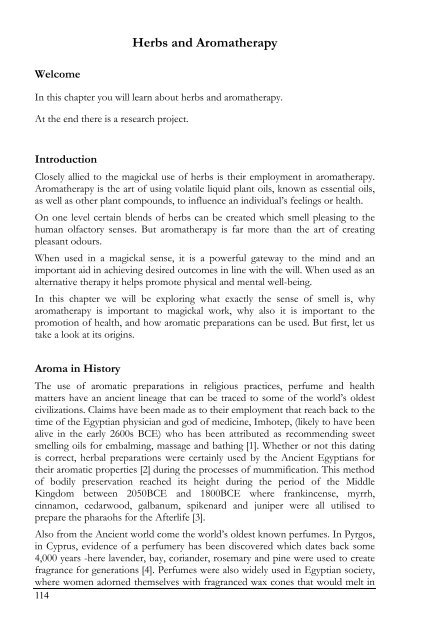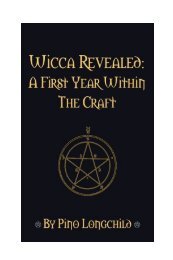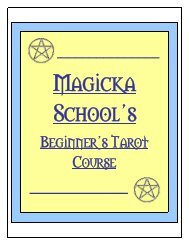A Magickal Herball Compleat.pdf - Magicka School
A Magickal Herball Compleat.pdf - Magicka School
A Magickal Herball Compleat.pdf - Magicka School
Create successful ePaper yourself
Turn your PDF publications into a flip-book with our unique Google optimized e-Paper software.
Welcome<br />
Herbs and Aromatherapy<br />
In this chapter you will learn about herbs and aromatherapy.<br />
At the end there is a research project.<br />
Introduction<br />
Closely allied to the magickal use of herbs is their employment in aromatherapy.<br />
Aromatherapy is the art of using volatile liquid plant oils, known as essential oils,<br />
as well as other plant compounds, to influence an individual’s feelings or health.<br />
On one level certain blends of herbs can be created which smell pleasing to the<br />
human olfactory senses. But aromatherapy is far more than the art of creating<br />
pleasant odours.<br />
When used in a magickal sense, it is a powerful gateway to the mind and an<br />
important aid in achieving desired outcomes in line with the will. When used as an<br />
alternative therapy it helps promote physical and mental well-being.<br />
In this chapter we will be exploring what exactly the sense of smell is, why<br />
aromatherapy is important to magickal work, why also it is important to the<br />
promotion of health, and how aromatic preparations can be used. But first, let us<br />
take a look at its origins.<br />
Aroma in History<br />
The use of aromatic preparations in religious practices, perfume and health<br />
matters have an ancient lineage that can be traced to some of the world’s oldest<br />
civilizations. Claims have been made as to their employment that reach back to the<br />
time of the Egyptian physician and god of medicine, Imhotep, (likely to have been<br />
alive in the early 2600s BCE) who has been attributed as recommending sweet<br />
smelling oils for embalming, massage and bathing [1]. Whether or not this dating<br />
is correct, herbal preparations were certainly used by the Ancient Egyptians for<br />
their aromatic properties [2] during the processes of mummification. This method<br />
of bodily preservation reached its height during the period of the Middle<br />
Kingdom between 2050BCE and 1800BCE where frankincense, myrrh,<br />
cinnamon, cedarwood, galbanum, spikenard and juniper were all utilised to<br />
prepare the pharaohs for the Afterlife [3].<br />
Also from the Ancient world come the world’s oldest known perfumes. In Pyrgos,<br />
in Cyprus, evidence of a perfumery has been discovered which dates back some<br />
4,000 years -here lavender, bay, coriander, rosemary and pine were used to create<br />
fragrance for generations [4]. Perfumes were also widely used in Egyptian society,<br />
where women adorned themselves with fragranced wax cones that would melt in<br />
114




